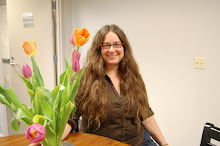In Brzezinka, Poland, we rode in a bus for an hour out into the cold night. We stopped at the edge of a forest. A man with a kerosene lantern was waiting for us. He led us through the trees, to an old brick flour mill. Inside was a small vaulted cement hall. A fireplace taller than a man burned sixteen logs. On a plywood table were laid olives, feta cheese, bread, and wine. After an unhurried time to warm ourselves, we were led into a wide low-ceilinged room dotted with more than 90 slim candles. "Curtain time," in this scenario, meant "What time the bus leaves town."
As we entered, we passed seven people in a huddled circle, singing. On the far side of the room, we sat on long low wooden benches like first-graders. Still singing, two of the women broke away and began calmly blowing out candles. Gradually the room darkened as only sixty, twenty, six, three candles were left. Blackness.
In the middle of the forest, in the middle of the night, surrounded by brick walls three feet thick, invisible voices lamented to us in Polish.
This medieval strangeness is theatre.
The work was Teatru ZAR's Ewangelii Dzieciństwa (Gospels of Childhood), from Dostoyevski. Teatru ZAR works out of the Grotowski Center in Wroclaw, if you find yourself in Poland.
In Seattle, the only theatre that sings to you like that is another Grotowski descendant, Akropolis Performance Lab. Co-artistic director Jennifer Lavy is the reason they sing. Grotowski said their singing was the most remarkable thing about their theatre.
For more details on Brzezinka, see also this post.
Subscribe to:
Post Comments (Atom)

No comments:
Post a Comment